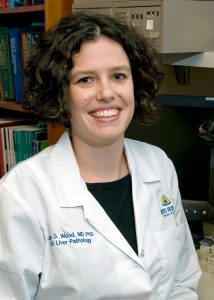
Laura D. Wood, MD, PhD
Principal Investigator
Laura received her BS in Biology from the College of William & Mary. She went on to earn both her MD and PhD from The Johns Hopkins University School of Medicine, where she led the first whole exome sequencing studies in human cancers during her PhD work. She then completed residency in Anatomic Pathology (serving as Chief Resident in her final year) and fellowship in Gastrointestinal and Liver Pathology at The Johns Hopkins Hospital. Laura is currently an Associate Professor in the Department of Pathology, Division of Gastrointestinal and Liver Pathology at the Johns Hopkins University School of Medicine. She leads her own basic science laboratory focused on molecular characterization of pancreatic cancer and its precursor lesions. In addition, she signs out clinical specimens on the Gastrointestinal Pathology service.
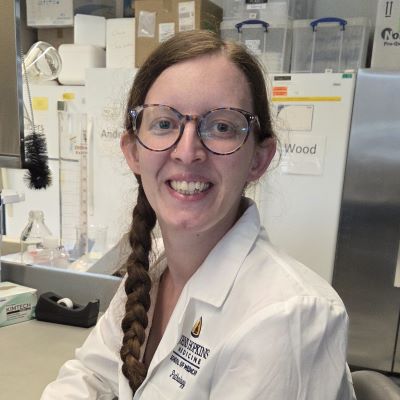
Abby Cornwell, PhD – Postdoctoral Fellow
Abby received her B.S in Biochemistry from Worcester Polytechnic Institute. She completed her PhD in Pharmacology in Dr. Michael Feigin’s laboratory at Roswell Park Comprehensive Cancer Center through the University at Buffalo. Her thesis project titled, “Investigating the Impact of Benzodiazepines on the PDAC Tumor Environment” was funded by an F31 predoctoral grant from the NCI and led to a first author publication in Clinical Cancer Research. Abby joined Dr. Wood’s laboratory in September 2023. Her current project is investigating the relationship between blood type and pancreatic cancer development.
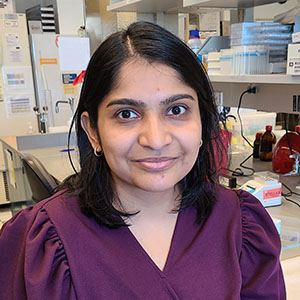
Prathima Nagendra, PhD – Postdoctoral Fellow
Prathima obtained her Bachelor’s in Engineering in Biotechnology from Visvesvaraya Technological University, India. She has a Masters in Molecular Genetics from the Department of Genetics, University of Leicester, UK, where she worked on novel L1 retrotransposons in retinoblastoma for her research project. She worked as a research assistant at JNCASR, India, working on glioblastoma. She went on to pursue a PhD in Medical Biochemistry working on the initiation mechanisms of precursor lesions of serous ovarian carcinoma in the fallopian tubes. In Wood lab, she is exploring the molecular heterogeneity in IPMNs and also the mechanisms of transition of IPMNs from low-grade to high-grade dysplasia.
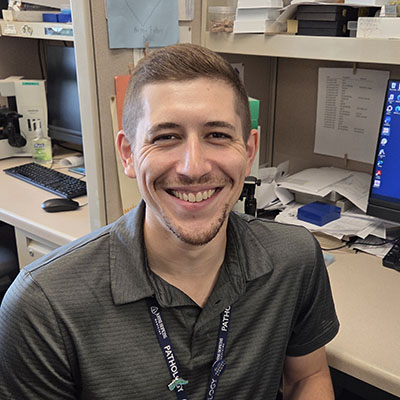
Brian Pedro, MD, PhD – Postdoctoral Fellow
Brian obtained his BA in biochemistry from Tufts University in Medford, MA. He then earned his MD and PhD degrees from Emory University School of Medicine in Atlanta, GA, where his research focused on leader and follower cell cooperativity in collective cancer invasion. Brian began Anatomic Pathology residency at Johns Hopkins Hospital in 2022, joining the Wood lab as a postdoctoral researcher in 2024 as part of the physician scientist research track. Brian’s postdoctoral research focuses on leveraging 3D multi-omics analyses to characterize precancerous lesions in human pancreatic and colorectal tissue. After residency, Brian will remain at Johns Hopkins for gastrointestinal/liver pathology fellowship training.
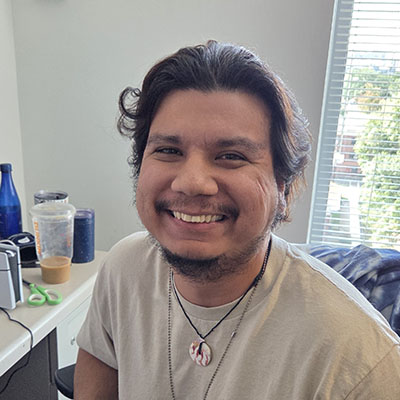
Daniel Salas-Escabillas, PhD – Postdoctoral Fellow
Daniel is a proud CHamoru scientist from Guam who believes that every cell has a story to tell—sometimes you just have to read between the (genetic) lines. He earned his PhD in Cancer Biology from the University of Michigan with Dr. Howard Crawford, where his dissertation uncovered a previously unrecognized tuft cell transdifferentiation program in pancreatic ductal adenocarcinoma, revealing how these rare cells help tumors adapt and spread. Now a postdoctoral fellow in the Wood Lab at Johns Hopkins, he’s trading mouse models for organoids and computational tools, using spatial transcriptomics to map how pancreatic tumors invade surrounding structures and normal tissue. Daniel hopes to one day build his own lab at the crossroads of animal models, cellular plasticity, bioinformatics, and human samples—and along the way, he’s committed to mentoring students from underrepresented and resource-limited backgrounds, helping them find their own place in the scientific “tissue.”
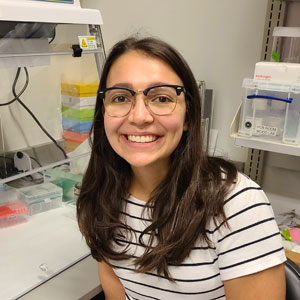
Sarah Graham, BS – Doctoral Student
Sarah attended the University of Arizona where she received a BS in Nutritional Sciences. Additionally, she was part of the Ronald E McNair Post-Baccalaureate Achievement Program. Her interests in cancer immunology led her to investigate the mobilization of natural killer cells and T cells in response to exercise to improve allogeneic stem cell transplantation in hematological cancers. Sarah joined the Wood lab as a graduate student in the Cellular and Molecular Medicine PhD program. She is interested in characterizing cellular and molecular alterations in the progression of low-grade to high-grade pancreatic intraepithelial neoplasia (PanIN) to improve early detection methods in pancreatic cancer.
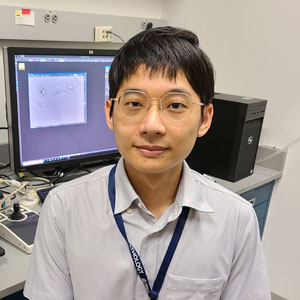
Cheng-Chieh Huang, MS – Doctoral Student
Cheng-Chieh is from New Taipei City, Taiwan and completed a BS in Life Science at National Chung Hsing University, where he conducted research into how protein kinases regulate lamin assembly in cancer cell lines. This experience ignited him to apply for a MS in Biochemistry and Molecular Biology from National Taiwan University. His previous research focused on the relationship between pancreatic cancer and type II diabetes. For his PhD thesis, Cheng-Chieh joined the Wood lab as a graduate student in the Pathobiology program. His research currently focuses on exploring tumor signaling pathways in the pancreatic tumor microenvironment using molecular approaches and 3D organoid models.
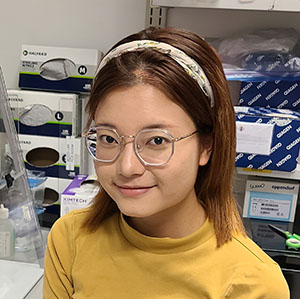
Jessie Kanacharoen, MS – Doctoral Student
Jessie is a PhD student in the Cellular and Molecular Medicine program. Originally from Bangkok, Thailand, she came to the US after high school graduation to pursue a Combined MS/BS in Molecular and Cellular Biology from Johns Hopkins University. Her Master’s thesis was on the prostate cancer stem cell state. She joined the Wood lab in 2023, and her PhD work will explore the multi-omic analysis of precancerous and cancerous pancreatic lesions.
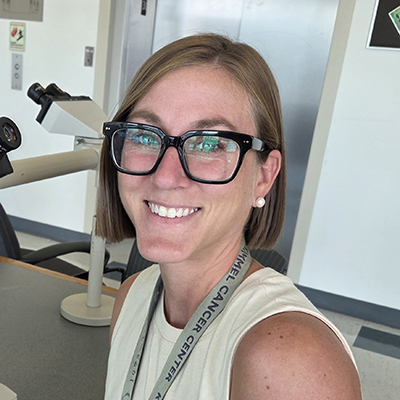
Kara Anne Lombardo, BSc – Doctoral Student
Kara is a PhD candidate in the Cellular and Molecular Medicine program. Her dissertation research investigates the cellular and molecular risk factors that promote progression of precancerous pancreatic intraepithelial lesions (PanINs). She graduated with her BS from Salve Regina University in 2012 and prior to her doctoral training, conducted translational cancer research in the pathology departments of Johns Hopkins and Brown University, with expertise in histology, biomarker discovery, and tumor immunology. She has co-authored more than 60 peer-reviewed publications and is passionate about understanding early cancer evolution to inform precision medicine.
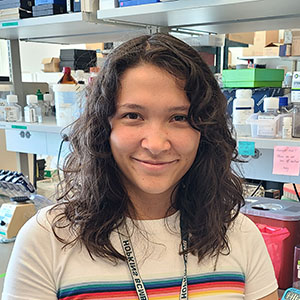
Abigail Sipes, BS – Doctoral Student
Abigail received her BS in Biochemistry from Purdue University in 2022. At Purdue her research focused on identifying metabolic precursors in Arabidopsis. She also worked at the University of Hawaii Cancer Research Center on gene environment interactions in malignant mesothelioma, discovering her interest in oncology. Abigail joined the Wood lab in 2023 as a PhD student in the Biochemistry, Cellular and Molecular Biology program. She is interested in the molecular mechanisms driving the progression of low-grade to high-grade IPMNs to identify targets for therapeutic intervention in pancreatic cancer.
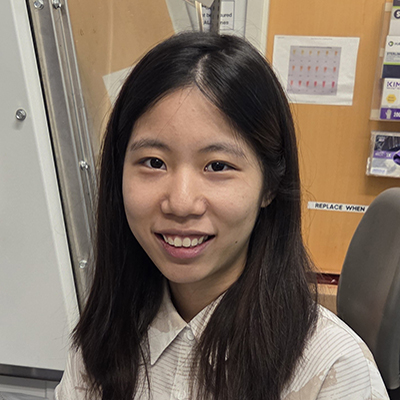
Nephele (Yuqian) Wang, MS – Doctoral Student
Nephele is from Guangzhou, China. She came to the US after high school and received a BS in Biological Sciences at University of California – Irvine, where her thesis focused on endogenous cellular response after spinal cord injury. She then came to Johns Hopkins to pursue a Master’s degree in Biochemistry and Molecular Biology in the School of Public Health. Her Master’s thesis was on breast cancer cell invasion. She joined the Wood lab in 2025 as a PhD student in the Cellular and Molecular Medicine program. Her work will explore the therapeutic potential of targeting RAS in precancerous pancreatic lesions aiming for cancer prevention.
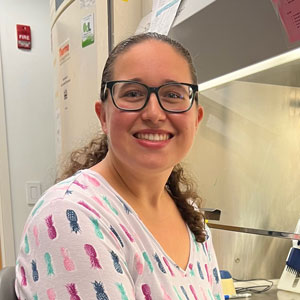
Maria Wissler, AB – Doctoral Student
Maria earned her AB in Molecular Biology from Princeton University in New Jersey where she conducted research on phospholipid trafficking by bacterial transmembrane proteins. From there, she went on to Merck as a scientist in Chemical Biology where she worked on programs in metabolic disease, neurodegeneration, and cancer. She is currently a graduate student in the Cellular and Molecular Medicine Program. For her thesis, Maria is interested in studying the tumor microenvironment and its effects on organoid invasion.
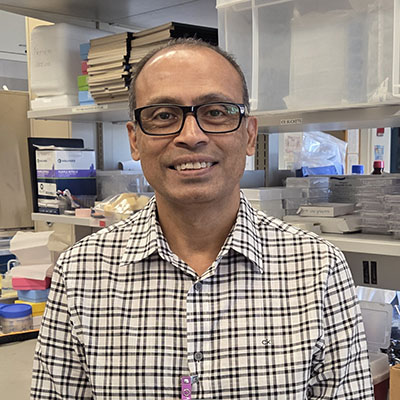
Mahmood Khan, MS – Research Specialist
Mahmood received his BS degree in Microbiology from McGill University in Canada and his MS degree in Biotechnology from Johns Hopkins University. He joined the Wood lab in 2024 and works as the laboratory manager. Previously Mahmood worked at the Wilmer Eye Institute doing research on age related macular degeneration, diabetic retinopathy and retinitis pigmentosa.
